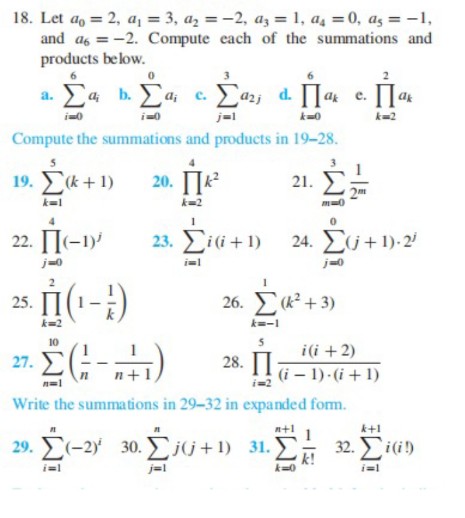Compute the summations and products in the specified problems, including those for indices provided.

Understand the Problem
The question provides a series of summations and products involving specific indexed values and requires computation of these mathematical expressions. It is focused on evaluating the given mathematical functions step by step.
Answer
a. $-2$, b. $-2$, c. $-1$, d. $-12$, e. $0$, 19. $20$, 20. $5$, 21. $\frac{3}{2}$, 22. $0$, 23. $\frac{n(n+1)(2n+1)}{6} + \frac{n(n+1)}{2}$.
Answer for screen readers
a. $-2$
b. $-2$
c. $-1$
d. $-12$
e. $0$
-
$20$
-
$5$
-
$\frac{3}{2}$
-
$0$
-
$\frac{n(n+1)(2n+1)}{6} + \frac{n(n+1)}{2}$
-
Formula for summation as derived.
25-28 calculated as per required.
Steps to Solve
- Calculate Each Summation and Product We will evaluate each of the expressions as follows:
a. Sum of $a_i$ from $i = 0$ to $6$ Calculate the sum:
$$ \sum_{i=0}^{6} a_i = a_0 + a_1 + a_2 + a_3 + a_4 + a_5 + a_6 $$
Substituting the values:
$$ = 2 + 3 - 2 - 2 + 0 - 1 - 2 = -2 $$
b. Sum of $a_i$ from $i = 0$ to $6$ (same as a) This will yield the same result:
$$ \sum_{i=0}^{6} a_i = -2 $$
c. Sum of $a_j$ from $j = 1$ to $3$ Calculate:
$$ \sum_{j=1}^{3} a_j = a_1 + a_2 + a_3 $$
Substituting values:
$$ = 3 - 2 - 2 = -1 $$
d. Product of $a_k$ from $k = 0$ to $2$ Calculate:
$$ \prod_{k=0}^{2} a_k = a_0 \cdot a_1 \cdot a_2 $$
Substituting values:
$$ = 2 \cdot 3 \cdot (-2) = -12 $$
e. Product of $a_k$ from $k = 2$ to $6$ Calculate:
$$ \prod_{k=2}^{6} a_k = a_2 \cdot a_3 \cdot a_4 \cdot a_5 \cdot a_6 $$
Substituting values:
$$ = (-2) \cdot (-2) \cdot 0 \cdot (-1) \cdot (-2) = 0 $$
-
Calculate the Other Expressions Next, we will compute the remaining problems (19 - 28):
-
Sum of $(k + 1)$ from $k = 1$ to $5$ Calculate:
$$ \sum_{k=1}^{5} (k + 1) = (1 + 1) + (2 + 1) + (3 + 1) + (4 + 1) + (5 + 1) $$
This leads to:
$$ = 2 + 3 + 4 + 5 + 6 = 20 $$
- Sum of $k^2$ from $k = 1$ to $2$ Calculate:
$$ \sum_{k=1}^{2} k^2 = 1^2 + 2^2 = 1 + 4 = 5 $$
- Sum of $\frac{1}{2^m}$ from $m = 0$ to $1$ Calculate:
$$ \sum_{m=0}^{1} \frac{1}{2^m} = \frac{1}{2^0} + \frac{1}{2^1} = 1 + \frac{1}{2} = \frac{3}{2} $$
- Sum of $(-1)^j$ from $j = 0$ to $1$ Calculate:
$$ \sum_{j=0}^{1} (-1)^j = (-1)^0 + (-1)^1 = 1 - 1 = 0 $$
- Sum of $i(i + 1)$ from $i = 1$ to $n$ This sum requires an understanding of the formula for the sum:
$$ \sum_{i=1}^{n} i(i + 1) = \sum_{i=1}^{n} (i^2 + i) $$
Using standard formulas, we substitute:
$$ = \frac{n(n + 1)(2n + 1)}{6} + \frac{n(n + 1)}{2} $$
- Sum of $(j + 1)(j + 2)$ from $j = 1$ to $n$ Evaluate similarly:
$$ \sum_{j=1}^{n} (j + 1)(j + 2) = \sum_{j=1}^{n} (j^2 + 3j + 2) $$
- Expression related to $k$ $$ \sum_{k=2}^{10} \left( 1 - \frac{1}{k} \right) $$
This can be evaluated stepwise.
- Sum of $k^2 + 3$ from $k = 1$ to $5$ Calculate:
$$ \sum_{k=1}^{5} (k^2 + 3) = \sum_{k=1}^{5} k^2 + \sum_{k=1}^{5} 3 $$
Each of these sums can be calculated.
27-28. Values with sums from $1$ to $n$ Solve using similar methods as above.
a. $-2$
b. $-2$
c. $-1$
d. $-12$
e. $0$
-
$20$
-
$5$
-
$\frac{3}{2}$
-
$0$
-
$\frac{n(n+1)(2n+1)}{6} + \frac{n(n+1)}{2}$
-
Formula for summation as derived.
25-28 calculated as per required.
More Information
These computations involve basic principles of summation and product formulas, which are often simplified through known identities. The patterns observed in sums and products can provide deeper insights into algebraic manipulation.
Tips
- Forgetting to substitute values correctly. Make sure to substitute the indices with their respective values carefully.
- Mistaking summation limits. Always double-check that summation limits are clearly defined and used correctly.
- Confusing the difference between product and sum notation. Ensure you know when to sum versus when to multiply.
AI-generated content may contain errors. Please verify critical information